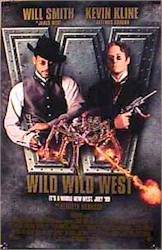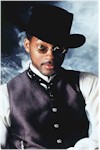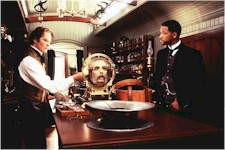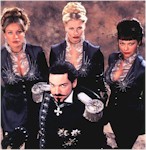|
| |
Wild Wild West
Review by KJ Doughton
Posted 16 July 1999
 |
|
Directed by Barry Sonnenfeld Starring
Will Smith, Kevin Kline,
Kenneth Branaugh, Salma Hayek,
and Ted Levine
Written by S.S. Wilson, Brent Madock,
Jeffrey Price and Peter S. Seaman |
Wild, Wild West joins The Avengers, Hudson
Hawk, The Last Action Hero, Hook, Willow, and Legend as an
elaborately overpriced, over-hyped, and overproduced shell of a movie that will make
history only as one of the screens more self-indulgent box-office bombs. It’s got all
the trimmings a studio green-lighting can buy, but there’s no main course. Watching Wild,
Wild West is the cinematic equivalent to a night of dining at Planet Hollywood: you
take in the garish, noisy atmosphere only to find that the food sucks. Oh, sure, it will
fill theaters during the all-important opening weekend, but filmgoers are wising up to
half-baked concepts unwisely brought to light by would-be auteurs turned industry hacks
(Penelope Spheeris, this means you). Will Smith might have a playful energy during his
current acting phase as a Nick Cage-style action hero, but he could use another turn like
his early Six Degrees of Separation turn as a gay con man to keep this one-time
Fresh Prince fresh. Meanwhile, Barry Sonnenfeld’s brilliant cinematography in early
Coen Brothers films has given way to a more mainstream, run-of-the-mill directorial style
wasted primarily on resurrected television sitcoms-turned-films. Wild, Wild West is
an overstuffed vanity trip for both of these talents: a rickety stagecoach of a movie that
careens through dusty plains before plummeting over a steep cliff.
Wild, Wild West begins as a man is beheaded by a sawblade: it sounds gruesome, but
the same Sonnenfeld touch that tightroped between the Addams Family’s goth
grotesqueness and gallows humor creates a live-action comic strip from the scene.  This light humor
diffuses the gore, much like John Woo’s dance-like choregraphy and coyote-roadrunner
chases offset the grisly shootouts of his films. The following frames of the film
aren’t nearly as effective, as the characters of Captain James West (Smith) and U.S.
Marshal Artemus Gordon (Kevin Kline) are established. In the 1960’s television series
on which Wild, Wild West is based, West and Gordon were secret service agents
assigned to work together by President Ulysses S. Grant. In true Phantom Menace
style, the prequel-style film takes on the task of explaining precisely how this unlikely
twosome was established. There’s a scene involving the interrogation of seedy General
McGrath (The Silence of the Lambs’ Ted Levine) by a drag-garbed Kline, in
which the Marshal’s attempts to hypnotize to former is supposed to establish the
wise-cracking humor and high-tech gadgetry that will accent to rest of the film. But even
in a floozie’s dress and wig, Kline seems stiff and somewhat anxious: he’s a far
more drab comic presence than he was during his Oscar-winning turn as the dense,
pretentious Otto in A Fish Called Wanda. Meanwhile, Smith has a smooth charm --
he’s likeable in a Tom Hanks kinda way even when he’s brutalizing lawbreakers in
the post-Civil War South (although the concept of an African American federal agent
materializing during this time period is unlikely, at best). This light humor
diffuses the gore, much like John Woo’s dance-like choregraphy and coyote-roadrunner
chases offset the grisly shootouts of his films. The following frames of the film
aren’t nearly as effective, as the characters of Captain James West (Smith) and U.S.
Marshal Artemus Gordon (Kevin Kline) are established. In the 1960’s television series
on which Wild, Wild West is based, West and Gordon were secret service agents
assigned to work together by President Ulysses S. Grant. In true Phantom Menace
style, the prequel-style film takes on the task of explaining precisely how this unlikely
twosome was established. There’s a scene involving the interrogation of seedy General
McGrath (The Silence of the Lambs’ Ted Levine) by a drag-garbed Kline, in
which the Marshal’s attempts to hypnotize to former is supposed to establish the
wise-cracking humor and high-tech gadgetry that will accent to rest of the film. But even
in a floozie’s dress and wig, Kline seems stiff and somewhat anxious: he’s a far
more drab comic presence than he was during his Oscar-winning turn as the dense,
pretentious Otto in A Fish Called Wanda. Meanwhile, Smith has a smooth charm --
he’s likeable in a Tom Hanks kinda way even when he’s brutalizing lawbreakers in
the post-Civil War South (although the concept of an African American federal agent
materializing during this time period is unlikely, at best).
Essentially, the teaming of Smith’s macho, womanizing, Eastwoodian (he’s
critiques by President Grant as "someone who shoots first, shoots later, and when
everyone’s dead, ask a few questions") West and Kline’s brainy,
gizmo-inventing Gordon is a failed attempt to provide some contrast. The film tries to
demonstrate the at-odds nature of this coupling, before showing how the differences are
complimentary. This tired foes-to-friends buddy formula can still work. It was a
serviceable component in Sonnenfeld’s earlier Men In Black, when the animated
Smith and stone-faced Tommy Lee Jones created an entertaining chemistry -- but
there’s so much static thrown at the screen this time around that the relationship
seems forced and wooden.
 Wild Wild
West’s plot centers around this duo’s attempts to stop the kidnapping of the
president by the flamboyantly demented Dr. Loveless (Kenneth Branaugh). His lower body
lost to a wartime explosion, Loveless mobilizes himself in a steam-driven wheelchair, and
plots to take over the world with his elaborate arsenal of weaponry. With all the bizarre,
Jules Verne-inspired steel ‘n steam gadgetry surrounding him, Branaugh looks like a
refugee from David Lynch’s Dune. His confrontations with West are based on
racist and cruel one-upmanship. "A haven’t seen you in a coon’s age,"
says Loveless. "Well," retorts west, "keeping in touch with everyone is
enough to cut a guy off at the knees." By the time Salma Hayek emerges as a damsel
whose scientist-father has been captured by the devious Dr. Loveless, the tone is set for
similarly tacky butt ‘n breast innuendo. Wild, Wild West takes its heralded
place alongside American Pie, Big Daddy, and South Park in defining the
current cultural zeitgeist of cynical, sophomoric wise cracking at the movies, in which
cruelty emerges as the punch line of every juvenile joke. Wild Wild
West’s plot centers around this duo’s attempts to stop the kidnapping of the
president by the flamboyantly demented Dr. Loveless (Kenneth Branaugh). His lower body
lost to a wartime explosion, Loveless mobilizes himself in a steam-driven wheelchair, and
plots to take over the world with his elaborate arsenal of weaponry. With all the bizarre,
Jules Verne-inspired steel ‘n steam gadgetry surrounding him, Branaugh looks like a
refugee from David Lynch’s Dune. His confrontations with West are based on
racist and cruel one-upmanship. "A haven’t seen you in a coon’s age,"
says Loveless. "Well," retorts west, "keeping in touch with everyone is
enough to cut a guy off at the knees." By the time Salma Hayek emerges as a damsel
whose scientist-father has been captured by the devious Dr. Loveless, the tone is set for
similarly tacky butt ‘n breast innuendo. Wild, Wild West takes its heralded
place alongside American Pie, Big Daddy, and South Park in defining the
current cultural zeitgeist of cynical, sophomoric wise cracking at the movies, in which
cruelty emerges as the punch line of every juvenile joke.
By the time this rambling mess of a movie features its big climax, with Loveless
helming a monstrous mechanical spider and leveling entire city blocks, one is tempted to
reflect back on what made Sonnenfeld such a "next-big-thing" whiz-kid back in
the early eighties.  His
camerawork in the 1984 Coen Brothers’ Blood Simple remains some of the most
imaginative and exciting in film history. In one scene, a woman’s frozen terror is
converted to a fight-or-flight getaway when a thrown newspaper rattles a screen door. In
another, an injured man attempts to flee from an automobile as a shovel-wielding assailant
follows him, with break lights illuminating the hunt in a sickening red haze.
Sonnenfeld’s twisted, lurching, fish-eye camera images would go on to haunt Raising
Arizona, Miller’s Crossing, and Throw Momma From the Train before
he used a more discreet style for Big, Misery, and other mainstream fare. By
the time Sonnenfeld graduated to directorial duties on such recent hits as The Addams
Family and Get Shorty, he’d continued to mesh a trademark cinematography
"look" with more commercial projects. However, it was always his subtle humor
and economical use of special effects that gave an edge to his work. Wild, Wild West,
with its raucous mishmash of loud, lumbering dialogue, effects, and music (including a
sad, marketing-as-usual tie-in rap song performed by Smith), is a lesson that less is
often more. Fortunately for Sonnenfeld, it’s not too late to hitch his train onto a
kindler, gentler track. His
camerawork in the 1984 Coen Brothers’ Blood Simple remains some of the most
imaginative and exciting in film history. In one scene, a woman’s frozen terror is
converted to a fight-or-flight getaway when a thrown newspaper rattles a screen door. In
another, an injured man attempts to flee from an automobile as a shovel-wielding assailant
follows him, with break lights illuminating the hunt in a sickening red haze.
Sonnenfeld’s twisted, lurching, fish-eye camera images would go on to haunt Raising
Arizona, Miller’s Crossing, and Throw Momma From the Train before
he used a more discreet style for Big, Misery, and other mainstream fare. By
the time Sonnenfeld graduated to directorial duties on such recent hits as The Addams
Family and Get Shorty, he’d continued to mesh a trademark cinematography
"look" with more commercial projects. However, it was always his subtle humor
and economical use of special effects that gave an edge to his work. Wild, Wild West,
with its raucous mishmash of loud, lumbering dialogue, effects, and music (including a
sad, marketing-as-usual tie-in rap song performed by Smith), is a lesson that less is
often more. Fortunately for Sonnenfeld, it’s not too late to hitch his train onto a
kindler, gentler track.
Contents | Features | Reviews
| Books | Archives | Store
Copyright © 1999 by Nitrate Productions, Inc. All
Rights Reserved.
| |
|